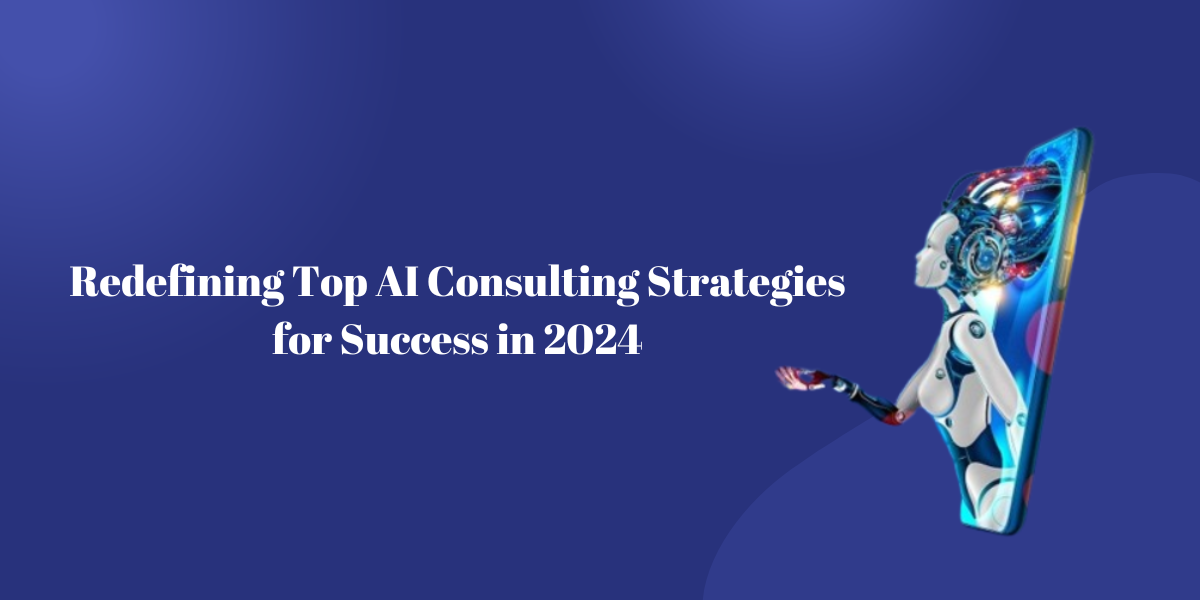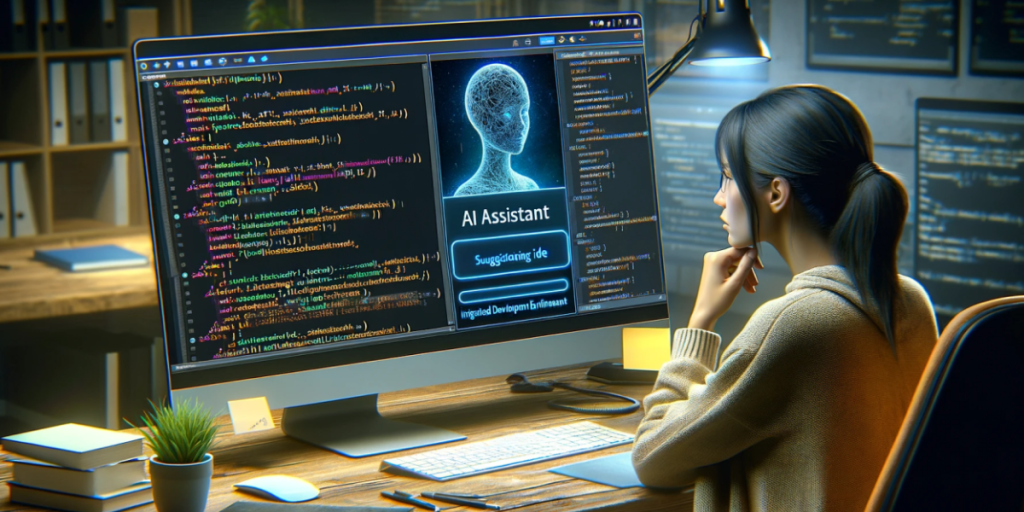In the digital age, where technological advancement is the norm, the significance of artificial intelligence (AI) cannot be understated. Recent research has revealed an intriguing statistic: over 91 % of companies have invested in AI consulting. This is not merely the trend but an essential shift in how companies optimize their processes and solve problems.
As the demand for Generative AI Integration Services increases and expands, AI consulting has transformed from a viable option to an essential requirement for companies looking to grow in the ever-changing marketplace. Join us in our quest to unravel the basics and provide an outline for starting your journey to AI consulting.
What Are AI Consulting Services?
In its essence, AI consulting is a process of expert data analysis and the use of AI techniques to tackle complicated business issues, increase productivity, and promote creativity. AI consulting has radically changed from basic data analysis to advanced machine learning (ML) and applications in data science. This is due to the advances in AI techniques and their growing application in different sectors.
AI Consulting Services provides expert guidance and support offered by artificial intelligence specialists, assisting businesses in identifying, developing strategies, and deploying AI-driven solutions. The services include various activities ranging from strategic planning to feasibility studies to custom-designed concept design, development, and integration into the current business process.
The Emergence Of AI Solutions
The rise of AI from academia to the leading edge of business strategy is a significant shift within the consulting field. Initially, AI’s function was restricted to purely areas of research and theory. However, rapid technological advances are bringing it to the forefront of innovation in business. Since AI technology advanced and impacted operations, customer interaction, and decision-making, traditional consultancy models primarily focused on business strategy and IT-related solutions began exposing their weaknesses.
The gap between traditional consultancy methods became evident as companies required more specific advice to navigate the complicated world of AI. There was a need for expertise in AI technology and an understanding of how AI could be strategically matched to their specific business objectives, market dynamics, and organizational structures. The result was AI strategic consulting, which is a field that blends technological AI knowledge with strategic business strategy.
Many case studies demonstrate the evolution of this field and show how AI strategic consulting has proven essential in the transformation of companies. One example is how a retail company employed AI consulting to incorporate advanced predictive analytics in their supply chain, dramatically increasing efficiency while reducing wasted materials. A different example is a healthcare company that benefited from AI strategy consulting to develop AI-driven diagnostics, which improved operations and patient care. These cases illustrate how AI strategy consulting is crucial for companies seeking to use Generative AI Integration capabilities to meet their needs in business.
The Process Of Crafting An AI Strategy
Developing the AI approach is a planned process requiring a series of critical processes tailored to the organization’s particular demands.
Initial Assessment And Goal Setting
First, an in-depth review of the company’s present condition, including its technology infrastructure, workforce capabilities, and market position, is conducted. The next step is to establish specific, realistic AI objectives for implementation that are aligned with the larger business goals.
Data Analysis And Feasibility Study
A thorough analysis of available data is carried out to assess its value, quantity, and importance to AI applications. The process also involves the feasibility analysis to determine if the AI goals can be achieved using the available resources and in the market context.
AI Strategy Formulation
An elaborate AI strategy is developed based on the initial assessment and findings. The plan outlines the precise AI technology to be employed, the timeline for their implementation timeframes, and the KPIs for critical indicators of performance (KPIs) for assessing the performance of AI initiatives.
Emerging Trends In AI Consulting For 2024
AI consulting, an ever-changing sector shaped by recent advancements in AI technology, is expected to shift significantly in 2024. The changing field will be affected by new trends and evolving customer demands. Some key trends that will shape AI consulting’s future include:
AI-Powered Automation
Automation With Generative AI Integration, using AI technologies to improve and improve human-powered tasks, is expected to enable the AI revolution for business. AI consultants are essential in helping clients develop and implement solutions to streamline various processes such as customer service, marketing operations, sales, finance, and human resources. The trend presents advantages and challenges requiring experts to develop robust and scalable AI solutions.
Prioritizing Customer Experience And Value Generation
AI can enhance customer experiences and create tangible value for businesses. It can customize customer interactions by making suggestions according to the individual’s preferences and behavior. Also it utilizes AI-driven analytics to gain information that aids in product development, marketing strategies, and improvements to customer service. It ensures that AI tools are easy to use and bring real value to the customer journey, increasing satisfaction and customer loyalty.
Ethics And AI concerns
Due to AI’s increasing impact on society, the ethical implications of AI technologies are becoming more critical. AI consultants must guide their clients on moral questions, including data privacy and security, governance, transparency, explanation ability, accountability, fairness, equity, inclusion, sustainability, and social responsibility.
AI For Decision-Making
The role of AI in aiding and improving the human decision-making process becomes the primary benefit of AI consulting. Consultants are crucial to helping clients design and implement AI tools that enable greater speed, efficiency, and better-informed decisions in strategic, tactical operational, personal, and strategic areas.
Leveraging Partnerships
There is no single entity in the world, particularly in AI. To accelerate AI initiatives, companies can tap into external expertise, technologies, and resources through partnerships and ecosystems. To be at the forefront of AI advancements, partner with research institutions, technology companies, and industry consortiums. Find co-innovation partnerships with your companies to design innovative AI-driven services, products, and business models.
Edge Computing
The combination of AI technologies on the edges of the network provides substantial potential in AI consulting. Consultants should assist clients in the battle against limitations of cloud-based AI, such as latency, connectivity, bandwidth, and security. Implementing AI systems that run on the edges can provide benefits such as instant processing, less cost, and distributed AI capabilities.
ChatGPT’s future ChatGPT is an exciting element that AI consultants should watch closely. As ChatGPT grows, it will have the potential to change how companies interact with conversations using AI, which will alter the landscape of AI consulting assignments.
AI in 2024 will experience transformational changes, affecting how AI consultants design their approaches and options. Being aware of the scope of AI 2024 is essential for experts to offer efficient and innovative services.
The future of AI is expected to continue determining the direction for AI consulting. Consultants must be aware of the latest technologies and techniques to anticipate and satisfy their customer’s ever-changing needs in the constantly changing world of future developments in AI.
How To Prepare For An AI Consulting Engagement?
The ever-changing and dynamic field of AI, which is a rapidly evolving field (of AI) collaboration with consultants, offers many opportunities for organizations to undergo transformational changes and improve their operations. To be successful is thorough planning. This guide has been designed to give you detailed knowledge of the most critical actions and methods required for any AI consultancy engagement, with in-depth knowledge that will provide clients with a solid and straightforward plan that will enable the smoothest and most efficient traversal of the many complexities involved in an AI consulting.
Understanding The Client’s Needs
Before we get into the exact details of working on an AI consulting project, we should be sure that we know our client’s needs. This will set the scene for creating a solution that is perfect for the client and meets their requirements.
Uncovering Business Objectives
Begin by speaking to the most important players in the process to learn the company’s objectives and issues. The first conversation is similar to the basis of a structure and will help guide the next actions in constructing one AI solution that is seamlessly adapted to the customer’s goals.
Defining The Project Scope
Once you have identified the most critical aspects during the first test, establishing clear objectives and requirements for your consultation tasks is the next step. This is about creating specific indicators to gauge the level of your success. This can be described as creating a plan that aligns with what the customer wants to achieve in the future.
The success of AI consulting relies on the knowledge and experience of your group. The ability to gather various people, including domain experts, data scientists, and IT experts, will ensure the most comprehensive approach to problem-solving.
The importance of forming an inclusive team is based on the idea that different abilities and perspectives improve the ability to solve problems. It could include recruiting analytics and data science experts, domain experts to provide contextual knowledge, and IT experts to ensure seamless integration with existing technology.
The effectiveness of any team depends on understanding the roles and responsibilities of each member. When you clearly define the duties of each team member, for example, naming an executive for coordination and data scientists who will be modeling and liaising with the client for efficient communications, you will ensure efficient cooperation.
Mastering The Data Game
A solid foundation for AI relies on the integrity of the data. Assessing existing data sources and addressing security and privacy concerns are crucial to ensuring the moral implementation of AI methods.
Assessing Data Quality
When we review the information, it’s more than just an instant look. It is carefully examined to ensure that it’s high-quality and relevant. Suppose we discover some missing parts and look for additional information from different sources. Doing this search helps create a comprehensive information collection essential to making AI function effectively. It’s similar to combining all the pieces in a puzzle to build a complete image.
Securing Data Privacy
Compliance with data rules is a requirement if security breaches pose a major issue. Implementing the proper AI methods involves ensuring data privacy and security throughout the project’s lifecycle and building trust with users and customers.
Tech Tools For Success
Selecting the appropriate technology stack is essential to successfully supporting the AI solution. By evaluating the current infrastructure and suggesting the most scalable and adaptable software, you can create seamless integration. Understanding the client’s technology framework is the first stage in making educated decisions. Finding compatibility and integration requirements will help ensure the success of an AI implementation.
The next stage in developing your AI project is exploring machine learning libraries, cloud-based platforms, and other software compatible with your project’s goals. Exploring these tools considers scalability and the ability to integrate them into current systems to create a unified technological framework.
Preparing for potential issues with scalability and integration is an effective strategy. Implementing strategies to overcome these issues will ensure a smooth change while avoiding disruptions during execution.
Mapping The Journey With Timelines
Creating a realistic timeline for the project that includes clear milestones is vital for effectively managing it. Separating the project into manageable stages will ensure a well-organized and effective workflow. Every project is different in difficulty, and recognizing this fact is vital in establishing a timetable. Planning enough for each stage or task and considering possible challenges will ensure an accurate and feasible timetable.
Determining the precise dates for goals is an essential element of effective project management. Every milestone, from data processing to model development, testing, validation, and deployment, is a critical phase of the AI consultation engagement. Every project, regardless of how carefully planned, is prone to danger. Successful projects require exhaustive risk assessment and mitigation strategies to tackle the challenges proactively.
In-depth risk analysis involves identifying technical issues, resource restrictions, and external influences that could affect the scope of work. The preemptive method allows for the creation of strategies for effectively reducing risk. A solid contingency plan and communication strategies are crucial to quickly navigating the risks. The proactive approach ensures that unexpected challenges are dealt with efficiently and with resilience while keeping the project on track.
Open Communication
Communication channels are the foundation of successful consulting engagements. Collaboration with the client by providing updates regularly and facilitating feedback is integral to the successful completion of the project. Communication channels that are transparent and clear, created from the beginning of the AI project, set the stage for ongoing collaboration. Meeting the client’s expectations and responding promptly to concerns contribute to a positive collaboration.
Informing the client with frequent updates is essential to maintaining transparency. Offering opportunities to provide input and cooperation ensures that clients’ views are actively considered, which results in a solution that will meet their changing needs.
Testing
Testing rigorously is the keystone of a successful AI implementation. Implementing robust processes ensures the precision and security of the algorithm and an iterative Generative AI Integration Process of refinement, which relies on feedback. Creating a thorough testing strategy allows for testing various scenarios and verifying the AI model’s capabilities completely.
Thorough testing is essential to ensuring accuracy. Resolving issues quickly and repeatedly improving the model by incorporating feedback can lead to continual improvement and top efficiency.The information gained during tests can be invaluable. Utilizing this feedback to aid in iterative improvement assures that the AI model grows, adapting to the specifics of the customer’s environment.
Deployment And Integration
Your success with your AI consulting engagements lies in implementing your AI solution. Ensuring that the deployment process is smooth and seamless integration with the existing system is crucial to a practical project result. Planned for a smooth and seamless deployment requires coordination with the IT department and the execution of strategies that minimize interruptions. This approach to collaboration ensures that the deployment process is smooth and executed correctly.
Making sure that the solution is seamless in its integration into other technology is one of the most important aspects of the effective implementation of every AI project. Resolving compatibility issues and providing assistance in the integration phase will ensure an integrated technological environment.
Continuous support after deployment is essential to the overall success of the AI consultation engagement. Inspecting the system’s performance, promptly dealing with any issues, and providing assistance will ensure a pleasant user experience and, ultimately, the achievement of the AI solution.
Enabling Via Knowledge Transfer
Enabling the client means transferring knowledge and expertise while ensuring long-term and independent administration for an AI solution. This aspect is vital to the solution’s longevity and sustainability. In-depth training sessions for the client’s personnel provide the client with the knowledge and abilities to run and manage the AI solution independently. This knowledge transfer will ensure a smooth transition after implementation.
Documenting processes using detailed methods, models, and methodologies is a valuable reference for clients and an invaluable resource for continuous monitoring and troubleshooting. To ensure sustainability over time, it is essential to provide customers with the resources and information needed for the independent administration and operation of an AI solution. This gives them an ownership mindset and the ability to adapt.
When the engagement is over, it marks the beginning of an ongoing improvement process. Post-engagement evaluations, feedback collection, and the identification of potential areas for improvement contribute to the iteration process inherent in AI consulting.
Reviewing The Project’s Achievements And Failures
Through detailed assessments provides invaluable information. Analyzing this introspective process helps inform future projects and is an ongoing learning process. Involving feedback gathering from employees and clients is an essential part of the continuous improvement process. Utilizing feedback from this to pinpoint the areas needing improvement and refinement assures a constant commitment to delivering the most effective solutions.
Future Trends In AI Consulting And Potential Market Growth Areas
AI consulting has the potential to discover new possibilities with new technologies and breakthroughs. The key trends for the future are:
Explainable AI (XAI)
As AI becomes more integrated into crucial decision-making processes, the need for clarity and explanation of AI models will grow to guarantee trust and ensure compliance.
AI In Edge Computing
Deploying AI algorithms directly onto devices on the edge can enhance the real-time processing of data capabilities. This is especially important for intelligent cities, autonomous vehicles, and IoT applications.
Quantum AI
Quantum computing can significantly improve AI’s ability to solve problems and will open opportunities for new ways to perform sophisticated simulations and optimizations.
AI For Environmental Sustainability
AI will be integral in monitoring and mitigating environmental problems like climate change and pollution while supporting conservation initiatives.
AI-Driven Healthcare Innovations
Beyond predictive analytics, AI can change how we edit genes, drug discovery, and telemedicine, providing breakthroughs in treatments and health care.
Augmented Creativity
In creative industries, AI will assist in creating music, designing, and producing content, increasing the human imagination with algorithms.
Implementing Future Trends In AI Consulting
To successfully implement AI trends in the future, consultants, practitioners, and customers should adopt best practices and strategies.
Make Use Of AI Frameworks And Methods
AI clients and consultants must utilize AI Canvas, the AI Ladder, and the AI Maturity Model for planning and executing AI projects. These frameworks aid in defining the scope of a project, establishing needs, developing solutions, and then assessing the results, all in line with AI’s future developments.
Create AI Capabilities And A Culture
Promoting AI capabilities, as well as a culture that is conducive to AI technology, is crucial. Initiatives such as the AI Academy, the AI Garage, and the AI Ethics Board aid in developing skills, promote collaboration, and promote experimentation. These are all critical factors in adapting to the changing needs of AI technology.
Join Forces With AI Experts And Suppliers
Collaboration with AI experts and suppliers, such as AI Research Institutes, AI Cloud Services, and AI Solution Providers, enables clients and consultants to use AI technology effectively. This helps customize and optimize the process and solve issues while keeping up with the changing technological landscape. AI technology for the coming years.
Wrapping Up
Starting in AI consulting doesn’t only mean taking advantage of new technology; it’s about steering your company toward a new era of opportunities. From integrating AI into your business goals to solving data-related issues, every action is an intentional step toward a more intelligent and forward-looking future.
AI consulting can take your company to unimaginable levels. Though there are obstacles in the path to advancement, you’ll eventually reach them thanks to the assistance of the correct AI consultancy firm.

























